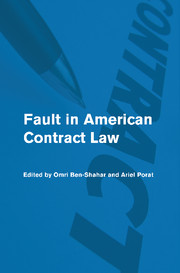Book contents
- Frontmatter
- Contents
- List of Contributors
- Preface
- Acknowledgment
- I THE CASE FOR STRICT LIABILITY
- II THE CASE FOR FAULT
- 4 How Fault Shapes Contract Law
- 5 Fault in Contract Law
- 6 The Role of Fault in Contract Law: Unconscionability, Unexpected Circumstances, Interpretation, Mistake, and Nonperformance
- III BETWEEN STRICT LIABILITY AND FAULT
- IV WILLFUL BREACH
- V COMPARATIVE FAULT
- VI THE MORALITY OF BREACH
- Case Index
- Subject Index
- References
5 - Fault in Contract Law
Published online by Cambridge University Press: 10 November 2010
- Frontmatter
- Contents
- List of Contributors
- Preface
- Acknowledgment
- I THE CASE FOR STRICT LIABILITY
- II THE CASE FOR FAULT
- 4 How Fault Shapes Contract Law
- 5 Fault in Contract Law
- 6 The Role of Fault in Contract Law: Unconscionability, Unexpected Circumstances, Interpretation, Mistake, and Nonperformance
- III BETWEEN STRICT LIABILITY AND FAULT
- IV WILLFUL BREACH
- V COMPARATIVE FAULT
- VI THE MORALITY OF BREACH
- Case Index
- Subject Index
- References
Summary
A promisor is strictly liable for breaching a contract, according to the standard account. However, a negligence-based system of contract law can be given an economic interpretation. This chapter shows that such a system is, in some respects, more attractive than the strict liability system. This may explain why negligence ideas continue to play a role in contract decisions, as a brief discussion of cases shows.
Introduction
Anglo-American contract law is said to be a strict liability system, but it could just as well be a fault-based system. Indeed, one can make a plausible case that a fault-based contract law would be superior to the strict liability system. A fault-based system would result in courts enforcing optimal contracts more systematically than they do currently – if courts could implement the system with sufficient accuracy. The disadvantage of such a system is that courts would need to make difficult inquiries and could make more errors. How the advantages and disadvantages balance out is hard to determine.
As many authors have noticed, although Anglo-American contract law is usually called a strict liability system, it does contain pockets of fault. Faultlike notions, such as good faith and best efforts, recur in the cases; and terms are often implied in order to ensure that obligations are reasonable rather than absolute. These doctrines reflect some of the advantages of the fault-based system, and strengthen the theoretical basis for the claim that fault ought to play a role in contract law.
- Type
- Chapter
- Information
- Fault in American Contract Law , pp. 69 - 81Publisher: Cambridge University PressPrint publication year: 2010
References
- 18
- Cited by

